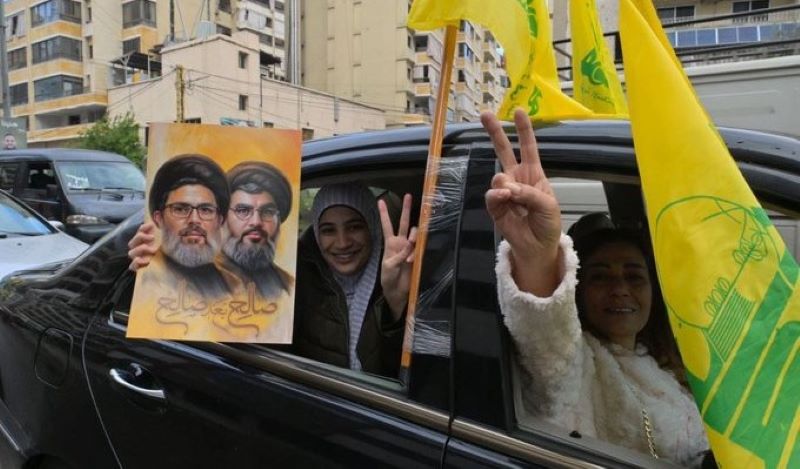By Michael Pröbsting
Waffenstillstand im Libanon: Eine politische Niederlage von Netanjahu, aber für Gaza bleiben Gefahren bestehen
More than two months after Israel escalated its aggression against Lebanon – with starting a ground invasion on 1 October – the war has ended with a ceasefire agreement. This deal entails the following main points:
Hezbollah and all other armed groups present on Lebanese territory will refrain from conducting any offensive actions against Israel. In return, Israel will not carry out any military offensive against targets in Lebanon.
Lebanon will deploy official security forces and the Lebanese Army along all border crossing points and the defined line for the southern zone, as outlined in the deployment plan. Israel will gradually withdraw from the southern zone of the Blue Line within a period of up to 60 days.
Both Israel and Lebanon recognize the importance of U.N. Security Council Resolution 1701. (This is the ceasefire resolution adopted at the end of the war in 2006).
These commitments do not waive Israel’s and Lebanon’s inherent right to self-defense.
The Lebanese security forces and the Lebanese Army will be the only entities authorized to carry weapons or deploy troops in southern Lebanon. The sale, provision, or production of weapons and related material in Lebanon will be supervised by the Lebanese government.
A committee approved by both Israel and Lebanon will be established to oversee and assist in the implementation of these commitments. Israel and Lebanon will report any violations of these commitments to the committee and to the United Nations Interim Force in Lebanon.
This ceasefire agreement comes after a devastating war in which Israel killed about 3,700 people (many of them civilians), displaced more than 1.3 million Lebanese and destroyed many homes. Due to its unchallenged air and intelligence superiority, the Zionist terror machine also succeeded to kill most of Hezbollah’s leadership (including their historic leader Hassan Nasrallah) and many cadres. However, Hezbollah – a military much weaker force with probably about 40-50.000 fighters – managed to resist relatively successfully the ground invasion of the Israeli army. They killed 60-90 Israeli soldiers, injured up to 900 and destroyed dozens of their tanks. As a result, the Zionist forces conquered only about half as much territory than it did in the 2006 war – despite the fact that this war lasted double as long. In addition, Hezbollah managed to fire thousands of missiles and drones against Israel, hitting targets not only in the northern border region but also in Haifa, Tel Aviv and even Prime Minister Netanyahu’s private residence in Caesarea.
Hezbollah’s struggle was severely hampered by the fact that it is a bourgeois-nationalist and sectarian movement. While its militants have been engaged in heroic resistance struggle against the Zionist invaders, its leadership has a long-standing record of collaborating with the theocratic capitalist regime in Iran, of supporting the tyrant Assad in Syria against the popular uprising, and of administering of Lebanese capitalism as part of coalition governments (which involves all kind of business interests of Shia capitalists). As a sectarian Shia Muslim organisation – the Shia Muslims constitute about 1/3 of Lebanon’s population, similar to the Sunni Muslims and the Christians – they can not and do not integrate other religious groups into the national liberation struggle against the Zionist enemy. Consequently, the regimes of Iran and Syria as well as reactionary local forces could put much pressure on Hezbollah to agree to the ceasefire since they are mostly interested in regional stability.
We understand that many people in Lebanon welcome or even celebrate the agreement as they have suffered terribly by the Israeli war of terror. Likewise, we are aware that the Lebanese Resistance lost many martyrs. Nevertheless, socialists can not endorse the ceasefire agreement because it betrays the ongoing struggle of the Palestinian people in Gaza. In fact, the whole conflict started after 7 October 2023 when Hezbollah responded to the call of Hamas to join the struggle against the Zionist occupation. It is telling that Netanyahu explained his support for the deal that it would “separate the fronts and isolate Hamas.” Furthermore, the deal entails the danger that it could expand the influence of U.S. and French imperialism over the country and its institutions. These Great Powers, in alliance with local reactionary forces, could try to utilize the official Lebanese Army as an obstacle for the liberation struggle. Of course, this is not guaranteed, and, in the end, it depends on the relation of forces. Still, the ceasefire agreement opens the window for such a reactionary development.
At the same time, however, the ceasefire agreement does also not represent a real victory for Israel. True, the initial goal of the right-wing Netanyahu government was to allow the return of the settlers in the northern border region (a goal which they should be able to achieve if the ceasefire holds). However, after the Zionist army succeeded to kill Nasrallah and many other leaders and hit thousands of cadres via the notorious pager attack in September, Netanyahu substantially expanded Israel’s goals and promised the total destruction of Hezbollah and transformation of the Middle East. The ceasefire agreement represents the failure of Netanyahu to achieve these goals. This is even more the case as Israel has become politically more isolated in world public opinion than ever before – first and foremost, thanks due to the unprecedented global pro-Palestine solidarity movement. This isolation is also reflected in the recently issued arrest warrant for Netanyahu and Gallant by the ICC – the first time ever that this court has turned against Western politicians. Despite the vacillations and conciliatory policies of the leaders of Hezbollah and the Palestinian resistance, this political defeat of Israel is a very hard blow to Zionism and to all imperialist policies, since the mass movement will understand that what has just happened is a sign that their main enemies are in a bad position, and, therefore, they can be confronted and defeated. In that sense, all imperialist powers and capitalism in general are weakened.
It is telling that according to a poll by Israel’s Channel 13 News, 61% of Israelis believe Israel has not defeated Hezbollah, with just 26% of them believing Israel did win. 44% of Israelis polled support the ceasefire agreement with Hezbollah, while 38% of people oppose the agreement. 2/3 of respondents believe that the war in Gaza should end. This indicates that Netanyahu’s megalomaniac war drive has suffered a serious setback.
It is difficult to predict the next steps in the war. Netanyahu and his zealot ministers will certainly try hard to rebuild their winner image – most likely by expanding even more their genocide in Gaza and the repression in Westbank. The Zionists have always been “best” in fighting women and children. It is also unlikely that the butcher-in-chief has given up his goal to “reshape the Middle East”. Hence, it is quite possible that Israel might restart the war in Lebanon or wage a serious attack against Iran in the coming months. At the same time, the Netanyahu government has always been fragile and the setback in Lebanon – in relation to their own maximalist goals – might revitalize the protests to demand a ceasefire and prisoners-exchange in Gaza. Given its numerous scandals full of corruption and treachery, the Netanyahu government is prone to collapse at every moment.
The Revolutionary Communist International Tendency (RCIT) and its section in Israel/Occupied Palestine – the Internationalist Socialist League – reiterate their unconditional support for the heroic resistance struggle against the Zionist monster on all fronts. We continue to side with the Palestinian factions – Hamas, PIJ, PFLP, DFLP, PRC, etc. – in their Herculean war of survival in Gaza. We stand for their military victory without lending political support for Hamas, Hezbollah and other petty-bourgeois nationalist or Islamist organisations.
However, in order to escape the trap of treacherous diplomacy of bourgeois regimes, of reactionary sectarianism, or self-defeating guerilla-militarism, the working class and the oppressed masses in Palestine, Lebanon and the whole region must organise themselves in popular councils and militias which are independent of all bourgeois forces. Most importantly, they need a revolutionary party fighting for socialist revolution in the Middle East.
In the current situation, it is crucial to intensify the international mobilisations in solidarity with the Palestinian people. The Zionist state must be boycotted by any means necessary – from blocking any arms deliveries, economic and financial boycott to the rupture of any ties of universities with Israel. Likewise, the struggle against any pro-Zionist leaders within the workers movement must be intensified. In Arab countries, the masses need to force an end of any attempt for “normalization” with the Zionist monster. Egypt must break the siege, confront the Israeli army and help the brothers and sisters. Arms and Aid for the Resistance! The strategic task is to overthrow all these reactionary servants of Israel and the imperialist powers and to replace these with authentic workers and fellahin governments, based on popular councils and militias.
We reiterate that the only way forward is the revolutionary destruction of the Israeli Apartheid state and the creation of a free and red Palestine from the River to the Sea. Such a single secular and democratic Palestinian state would enable all refugees to return to their homes. At the same time, it would guarantee equal cultural and religious rights for all citizens (including the Jewish minority). It should be a workers and fellahin republic as part of a socialist federation of the Middle East. As part of a revolutionary upheaval of the Arab masses, it will be possible to break a progressive section of the Israeli-Jewish workers and youth away from Zionism.





